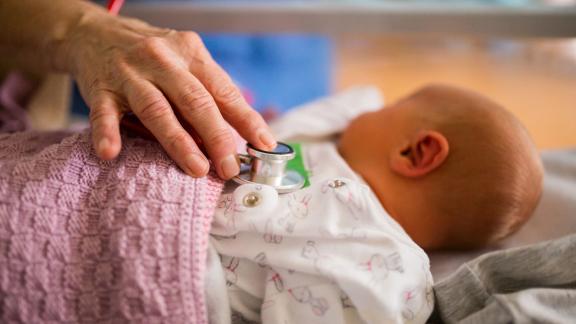Improving outcomes for premature babies in the west and south west of England

Launched in April 2020, PERIPrem (Perinatal Excellence to Reduce Injury in Premature Birth) is a unique perinatal care bundle co-created by maternity teams, neonatal teams and parents that has improved the outcomes for premature babies across the west and south west regions. The bundle consists of a number of clinical interventions that demonstrate a significant impact on brain injury and mortality rates amongst babies born earlier than 34 weeks.
Key benefits and outcomes
- A reduction in mortality for the smallest and most vulnerable babies in the south west.
- A reduction in the incidences of life-changing conditions usually associated with pre-term babies.
- Created and embedded a collaborative culture across the region, with all maternity units working together towards a shared ambition.
- PERIPrem contributes to achieving the NHS Long Term Plan commitment to a 50 per cent reduction in stillbirth, maternal mortality, neonatal mortality and serious brain injury by 2025.
What the organisations faced
Babies being born pre-term is the main cause of newborn baby deaths in the UK. Although survival rates are improving, rates of severe disability are not and there are increasing numbers of children with neuro-disabilities due to prematurity.
Although clinicians in the west and south knew each intervention for pre-term babies and their mothers incrementally improves the outcome for the baby, across the region clinicians from obstetrics, midwifery and neonatal teams were working in silos, delineated by profession.
Clinicians tended to focus on the treatment they delivered as a specific type of healthcare professional, rather than considering all treatment options that all staff could provide. This meant treatment may be given without considering how it interacted with other clinical interventions from different healthcare professionals, or how it could have better outcomes if it took place alongside them.
What the organisations did
The West of England and South West Academic Health Science Networks (AHSNs), worked in partnership with the South West Neonatal Network, a community of clinicians from 12 maternity and neonatal units in the region, decided to work together as a clinical community to change how care was delivered for pre-term babies. Maternity and neonatal teams worked with parents to co-create the PERIPrem (Perinatal Excellence to Reduce Injury in Premature Birth) bundle of care. The bundle consisted of existing clinical interventions for pre-term babies and their mothers, delivered by a variety of healthcare professionals, that demonstrate a significant impact on brain injury and mortality rates among babies born earlier than 34 weeks.
Bundling the care together placed the patients at the centre, ensuring staff considered each intervention’s use alongside the others, and supporting clinicians to work in a joined-up way to support better outcomes for patients.
Quality improvement and coaching were used to implement this approach across organisational and professional barriers.
The AHSNs provided backfill funding to each trust for a neonatal nurse and midwife to lead on the implementation of PERIPrem. Each trust was encouraged to identify champions for the project who advocated for certain clinical interventions within the bundle, such as maternal early breast milk, volume targeted ventilation, probiotics, and optimal umbilical cord management.
To support clinicians’ and patients’ understanding of each clinical intervention that formed the care bundle, the project leadership team developed a toolkit. Clinical and parent passports were created in a variety of languages to advise and reassure parents and families while their children were given treatment.
Because the project is about packaging existing care under one integrated umbrella, it was important for the project to have branding so staff and patients recognised it, as well as building a clinical community across the NHS trusts and creating momentum and chat between patients and staff about the work.
The AHSN gave innovation grants to each hospital, enabling them to purchase equipment to support patients on the PERIPrem journey. The AHSN commissioned an artist to create rainbow artwork with the PERIPrem branding, which was sent to parent partners to support understanding about the project and its clinical benefits to patients. This helped to create a recognisable identity for the bundle of care and a common language across the south west region to improve outcomes for all babies that are born pre-term.
Results and benefits
- The project achieved life-changing, sustainable improvements to how the most vulnerable patients are cared for. As of December 2021, 1,094 babies have been cared for using the PERIPrem bundle.
- Since the introduction of PERIPrem, early analysis of mortality and brain injury data shows a reduction in mortality for the smallest and most vulnerable babies in the south west compared to aggregated data for previous years.
- PERIPrem has created and embedded a collaborative culture across the region, with all maternity units working together towards a shared ambition.
- Together the PERIPrem clinical community ensured as many as possible pre-term babies had access to the most clinically appropriate care, at the right time and in the right place.
- PERIPrem has been recognised for the impact it has made to premature babies and their families. It was highly commended in the Patient Safety Pilot of the Year category at the 2021 HSJ Patient Safety Awards and was a finalist in the Provider Collaboration of the Year 2021 HSJ Awards.
- The NHS Long Term Plan (2019) commits to a 50 per cent reduction in stillbirth, maternal mortality, neonatal mortality and serious brain injury by 2025. PERIPrem contributes to achieving this.
Overcoming obstacles
The intention was to deliver PERIPrem using the principles of a model called a ‘breakthrough series collaborative,’ bringing all key stakeholders together face to face to share and learn best practice. Due to COVID-19 this had to pivot to virtual events. It was an interesting and innovative way of working. The PERIPrem team capitalised on new ways of communicating with teams across the region by hosting themed lunchtime share and learn sessions. These mostly focused on particular interventions within the care bundle, with staff and parents of pre-term babies from across the region sharing tips, as well as providing easier access to staff, without needing to travel. These sessions were recorded and form part of 20 share and learn resources, which can all be accessed on the West of England AHSN website.
Takeaway tips
- Have a shared goal – Being clear on what you’re trying to achieve helps maintain momentum and supports shared problem solving, when it can feel as if challenges are slowing down progress.
- Create a buzz – The more staff, patients and parents talk about the project, the more it feels real and is delivering benefits to patients every day.
- Create a shared language across organisations, across professions, with patients and parents. This helps understanding and supports patients to have clinically-based discussions with patients about various treatment and its benefits.
- Pivot – Be prepared to be agile and nimble and pivot your approaches when faced with external factors out of your control. Going virtual was a challenge, but actually supported much better engagement from staff, patients and parents, supporting a more active perinatal community and better clinical outcomes.
- Put the patient at the centre rather than focusing on professions, traditional roles, or differences between how individual trusts work. Focus on the patient and how best to deliver their care for the best clinical outcomes.
Further information
For more information on the work in this case study, please email:



